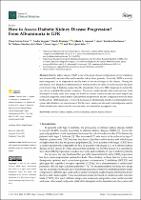| dc.contributor | Vall d'Hebron Barcelona Hospital Campus |
| dc.contributor.author | Vergara Arana, Ander |
| dc.contributor.author | Bermejo Garcia, Sheila |
| dc.contributor.author | Azancot Rivero, M Antonieta |
| dc.contributor.author | Sanchez Fructuoso, Ana Isabel |
| dc.contributor.author | Sánchez de la Nieta, M. Dolores |
| dc.contributor.author | Agraz Pamplona, Irene |
| dc.contributor.author | Soler Romeo, Maria Jose |
| dc.contributor.author | García-Carro, Clara |
| dc.date.accessioned | 2022-02-23T07:12:33Z |
| dc.date.available | 2022-02-23T07:12:33Z |
| dc.date.issued | 2021-06 |
| dc.identifier.citation | García-Carro C, Vergara A, Bermejo S, Azancot MA, Sánchez-Fructuoso AI, Sánchez de la Nieta MD, et al. How to Assess Diabetic Kidney Disease Progression? From Albuminuria to GFR. J Clin Med. 2021 Jun;10(11):2505. |
| dc.identifier.issn | 2077-0383 |
| dc.identifier.uri | https://hdl.handle.net/11351/7074 |
| dc.description | Enfermedad renal crónica; Diabetes mellitus; Enfermedad renal diabética |
| dc.language.iso | eng |
| dc.publisher | MDPI |
| dc.relation.ispartofseries | Journal of Clinical Medicine;10(11) |
| dc.rights | Attribution 4.0 International |
| dc.rights.uri | http://creativecommons.org/licenses/by/4.0/ |
| dc.source | Scientia |
| dc.subject | Nefropaties diabètiques - Diagnòstic |
| dc.subject | Diabetis - Complicacions |
| dc.subject | Nefropaties diabètiques - Tractament |
| dc.subject.mesh | Diabetic Nephropathies |
| dc.subject.mesh | /diagnosis |
| dc.subject.mesh | Diabetes Mellitus, Type 2 |
| dc.subject.mesh | /complications |
| dc.title | How to Assess Diabetic Kidney Disease Progression? From Albuminuria to GFR |
| dc.type | info:eu-repo/semantics/article |
| dc.identifier.doi | 10.3390/jcm10112505 |
| dc.subject.decs | nefropatías diabéticas |
| dc.subject.decs | /diagnóstico |
| dc.subject.decs | diabetes mellitus tipo II |
| dc.subject.decs | /complicaciones |
| dc.relation.publishversion | https://doi.org/10.3390/jcm10112505 |
| dc.type.version | info:eu-repo/semantics/publishedVersion |
| dc.audience | Professionals |
| dc.contributor.organismes | Institut Català de la Salut |
| dc.contributor.authoraffiliation | [García-Carro C, Sánchez-Fructuoso AI, Sánchez de la Nieta MD] Nephrology Department, San Carlos Clinical University Hospital, 28040 Madrid, Spain. [Vergara A, Bermejo S, Azancot MA, Agraz I, Soler MJ] Grup de Recerca en Nefrologia, Vall d’Hebron Institut de Recerca (VHIR), Barcelona, Spain. Servei de Nefrologia, Vall d’Hebron Hospital Universitari, Barcelona, Spain |
| dc.identifier.pmid | 34198818 |
| dc.identifier.wos | 000660124900001 |
| dc.relation.projectid | info:eu-repo/grantAgreement/ES/PE2013-2016/RD16%2F0009%2F0030 |
| dc.rights.accessrights | info:eu-repo/semantics/openAccess |

 Área privada
Área privada Contacto
Contacto







